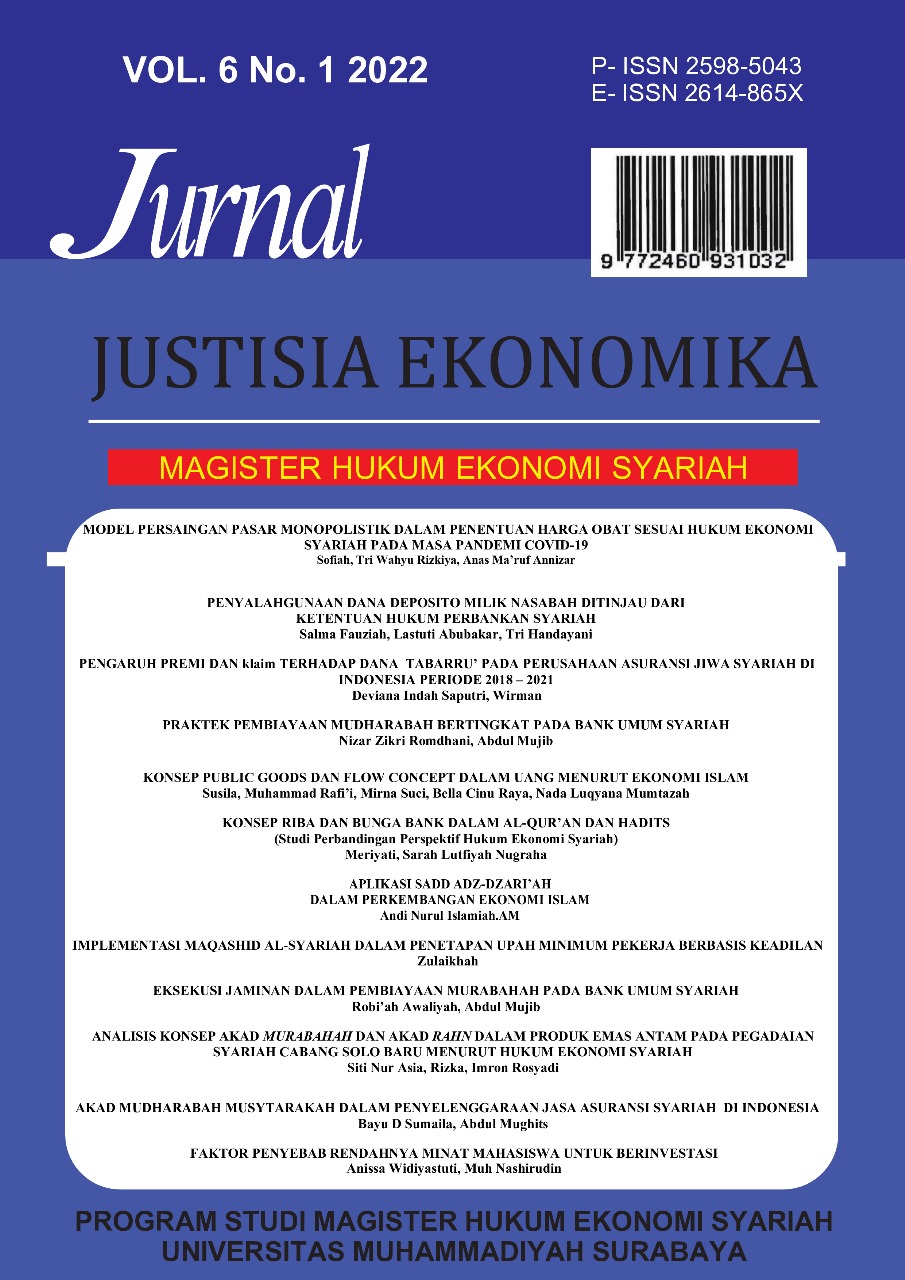IMPLEMENTASI MAQASHID AL-SYARIAH DALAM PENETAPAN UPAH MINIMUM PEKERJA BERBASIS KEADILAN
DOI:
https://doi.org/10.30651/justeko.v6i1.10689Abstrak
This research is intended to provide a solution in determining the minimum wage for workers that realizes a sense of justice based on values derived from Islamic sharia, so this research is focused on discussing how maqashid al-syariah is used as the basis for determining the minimum wage for workers in order to achieve a sense of justice for both workers and for employers. This research is limited to the following problem formulations: (1) How is the determination of the minimum wage for workers according to positive law; (2) How is the minimum wage for workers determined according to Islamic law; d (3) How is the implementation of maqashid al-syariah regarding the determination of the minimum wage for workers based on justice. This research is normative legal research or library research. The approach used is the statutory approach (that is, an approach in research that uses the law as the basis for its analysis) and the conceptual approach (this approach is used to build a concept where not or have not found clear legal rules regarding the problem under study). The results of this study are: (1) Determination of the minimum wage for workers by the Governor is based on a proposal from the Wage Council. The amount of wages that is considered for its determination is based on the results of a survey conducted by the Wage Council. (2) In Islamic law, the minimum wage is not determined with certainty either by the arguments of the Qur'an or Sunnah, but through the prevailing customs in society with the principle that the minimum wage provided by the employer must be able to meet the basic needs of the worker. and his family. (3) The implementation of maqashid al-syariah regarding the determination of the minimum wage for workers can be realized in the form of implementing sharia commands and abandoning sharia prohibitions in muamalah.
Keywords: Maqashid al-Syariah, Minimum Wage, Workers, Justice.
Referensi
Abdullah Wahab Khallaf, Ilmu Ushulul Fiqh, terj. Noer Iskandar al-Bansany, Kaidahkaidah Hukum Islam, Jakarta: PT. Raja Grafindo Persada, 2002.
Abu al-Fadhl Muhammad bin Mukrim bin Mandzûr, Lisan al-Arab, t.tp: Dȃr Shȃdir, 1300
Abu Ishaq al-Syathibi, Al-Muwafaqat fi Ushul al-Ahkam, Jilid 2, Beirut: Dar al-Fikr, 1995.
Ahmad al-Raisuni, Al-Fikr al-Maqashidi Qawa'iduhu wa Fawa'iduhu, Ribath: Mathba'ah al-Najah, 1999.
Dawam Raharjo, Etika Bisnis Menghadapi Globalisasi, dalam Prisma, nomor 2, Jakarta: LP3ES, 1995.
Fathurraman Djamil. Hukum Ekonomi islam: Sejarah, Teori dan Konsep. Jakarta: Sinar Grafika, 2015.
Fazlur Rahman, Al-Islam, Bandung: Pustaka, 1984.
Gemala Dewi, Hukum Acara Perdata Peradilan Agama di Indonesia, Jakarta: Kencana, 2006.
Imam al-Syaukani, Nailul Authar, jilid 4, Kairo: Dar al-Hadis, 2000.
Ismail Nawawi, Fikih Muamalah Klasik dan Kontemporer, Bogor: Ghalia Indonesia, 2012.
J. Feinberg, Philosophy of Law, California: Wadsworth Publisher Company Inc, 1975.
J. Rawis, A Theory of Justice, Massachusetts: Harvard Universit Press, 1971.
Jasser Auda, Maqashid al-syariah as Philosophy of Islamic Law: A System Approach, London, Washington: IIIT, 2008.
Muhammad Abu Zahrah, Ushul al-Fiqh, terj. Saefullah Ma’shum, et al., Ushul Fiqih, Jakarta: Pustaka Firdaus, 2005.
Muhammad Muslehuddin, Philosophy of Islamic Law and the Orientalist, New Delhi: Taj Company, 1986.
Muhammad Rasyid Ridha, Al-Mannar, Beirut: Dar al-Ma’rifah, tth.
Muhammad Thȃhîr Ibn ‘Âshûr, Maqȃshid al-Sharî’ah al-Islȃmiyyah, Dȃr al-Salȃm, Mesir, 1426 H.
Peter Mahmud Marzuki. Penelitian Hukum, Jakarta: Kencana, 2016.
Syed Nawab Haider Naqfi, Islam, Economic, and Society, Terjemahan Saiful Anam, Yogyakarta: Pustaka Pelajar, 2003.
Umar bin Shalih bin Umar, Maqashid al-Syariah 'inda al-Imam al-Izzuddin Ibn Abd al-Salam, Urdun: Dar al-Nafa'is, 2003.
Yusuf al-Qardhawi, Dirasah fi Fiqih Maqâshid Syari’ah: Baina al-Maqâshid al-Kulliyyah wa an-Nushush al-Juz’iyyah, Kairo: Dar as-Syuruq, 2006.
Unduhan
Diterbitkan
Cara Mengutip
Terbitan
Bagian
Lisensi
HAK CIPTA
Penulis yang mengirimkan artikel dalam jurnal Justisia Ekonomika harus memahami dan menyetujui persyaratan tentang hak cipta jurnal Justisia Ekonomika sebagai berikut:
1. Hak Cipta tulisan / artikel yang diterbitkan di jurnal Justisia Ekonomika otomatis menjadi hak pengelola jurnal atau publisher
2. Meskipun Hak Cipta atas tulisan yang telah diterbitkan di jurnal Justisia Ekonomika adalah menjadi haknya publisher, tetapi penulis masih mempunyai hak untuk : a). Penulis boleh meng-upload di repository kampus, b). Penulis boleh meng-upload di webnya sendiri, c). Penulis boleh meng-upload di google schoolar, orchid dan sinta
LISENSI
Lisensi atas tulisan / artikel yang diterbitkan di jurnal Justisia Ekonomika adalah menggunakan Creative Commons dengan atribusi CC-BY-NC 4.0






















